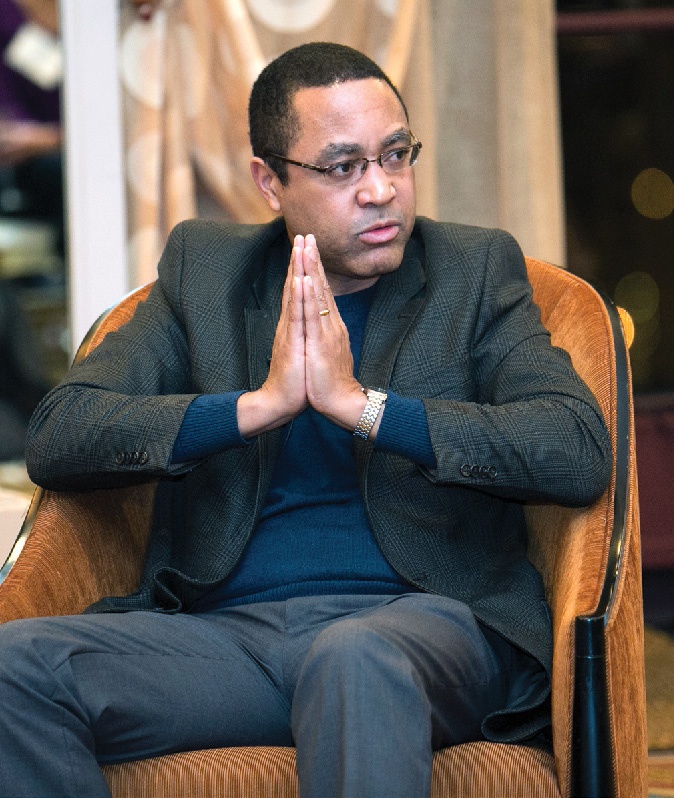Linguist John McWhorter’s career combines academics and media, a feat he says requires “two different brains.” He is an associate professor in the Department of English and Comparative Language, teaching classes such as “History of the English Language,” while also writing regularly for outlets including The New York Times, giving TED Talks about texting, and authoring 19 books on language and race (his most recent was the subject of a lengthy review in the May 15 issue of The New Yorker). McWhorter is also a regular contributor to a biweekly podcast on language and linguistics, “Lexicon Valley,” for Slate. He recently spoke to CCT about his love of lists, teaching the Core and the accelerated state of American media.
McWhorter was raised in Philadelphia; both of his parents earned advanced degrees while he was growing up. “I grew up in a house full of books,” he says. “I was one of those kids, a little professor. I loved making lists — I can still do useless things like rattle off the names of all of the Presidents’ wives.” From a young age he knew he wanted to teach and write and he was clear about his direction: “I loved writing little ‘books’ explaining things like what the parts of the body were — I didn’t know the terminology, but what I wanted to write was non-fiction.”
He joined the College faculty in fall 2008 as an adjunct professor teaching Contemporary Civilization. He had been an associate professor of linguistics at UC Berkeley from 1995 until 2003, then left academia to become a senior fellow at the Manhattan Institute for Policy Research in New York City, writing essays and commentary for the conservative-leaning think tank.
Teaching CC was “something I never thought I would be doing,” McWhorter says. He was reading a lot of material for the first time himself, and because the student body was so politicized in 2008 as a result of the Obama phenomenon, it made teaching the course especially interesting. “We learned a lot together,” he says.
In Spring 2010 he took a semester off and wondered if he would return to the College; Professor of Slavic Languages Alan Timberlake asked him to stay and teach “Introduction to Linguistics.” “I’m glad that happened,” McWhorter says, “and now I’m definitely here for the long haul.” His students were glad, too — in September 2011 Columbia’s student blog, BWOG, named McWhorter’s linguistics intro a “Class To Take Before You Die (Graduate).”
McWhorter continued to teach the Core, but he switched to Music Hum. As a musician who plays piano, he thought there would be less of a learning curve; still, he found it challenging: “Classical music has no significant place in modern American culture today. Nobody is going to come out and play a cello solo on Jimmy Fallon, so students don’t know what the joy of classical can be,” he says. “But I think once they’re exposed to it they get something they can benefit from.”
McWhorter still writes regularly for the popular press, which he calls “pleasurable but also ephemeral.” He says, “You write something, it gets lot of attention and then it’s gone. That’s the way the media is. Books are around forever but we’re moving away from a book age.” Podcasting has become a more satisfying outlet for him. “I’m finding that talking into people’s ears is the new medium that reaches smart people,” he says. “It’s faster and more immediate.”
He lives with his family in Jackson Heights, where he says “English speakers are the minority — it’s mostly Spanish or Chinese, or an Indian language or Russian.” As a linguist, he enjoys the scatterings: “I love to guess what people are speaking. Queens is one of the most linguistically diverse places on earth.”
His latest book, Talking Back, Talking Black: Truths About America’s Lingua Franca, a defense and celebration of Black English, generated some controversial reviews. “This is a book that says ‘Yes, racism has something to do with why people don’t like Black English,’ but telling people ‘If you don’t like Black English you’re a racist’ doesn’t change anybody’s mind. It hasn’t for the past 50 years,” McWhorter says. “The book takes linguistic arguments to say ‘Here’s why black speech isn’t incoherent’ and I tried to write it in an accessible way. But for many people the fact that I don’t stress the racism is noxious.” McWhorter was pleased and surprised to get such an extensive — and positive — review in The New Yorker (writer Vinson Cunningham says “[The author’s] intelligent breeziness is the source of the book’s considerable charm.”).
McWhorter has a sabbatical coming up, but he doesn’t have another book in the works. Instead, he plans to concentrate on teaching himself Mandarin. “If you’re a language guy in 2017, it’s not good enough anymore to talk about Spanish, German and Russian. I need to be able to handle Mandarin,” he says. He also wants to listen to more music and watch a lot of movies. Naturally, he has a list.
— Jill C. Shomer


